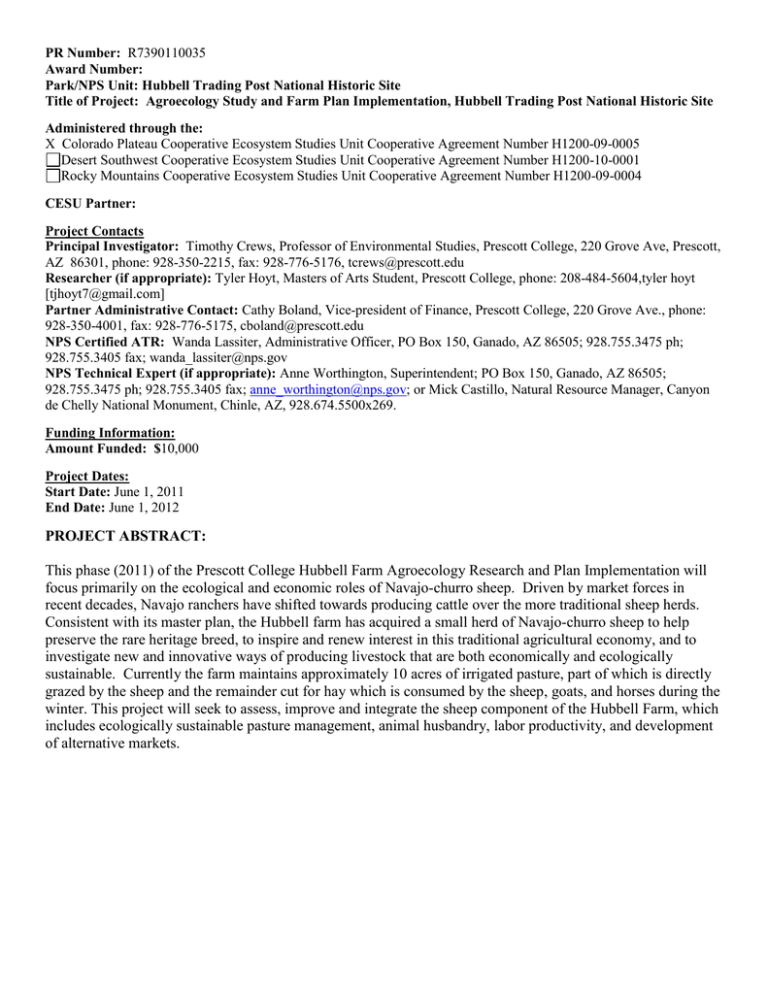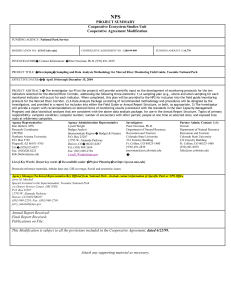PC-010
advertisement

PR Number: R7390110035 Award Number: Park/NPS Unit: Hubbell Trading Post National Historic Site Title of Project: Agroecology Study and Farm Plan Implementation, Hubbell Trading Post National Historic Site Administered through the: X Colorado Plateau Cooperative Ecosystem Studies Unit Cooperative Agreement Number H1200-09-0005 Desert Southwest Cooperative Ecosystem Studies Unit Cooperative Agreement Number H1200-10-0001 Rocky Mountains Cooperative Ecosystem Studies Unit Cooperative Agreement Number H1200-09-0004 CESU Partner: Project Contacts Principal Investigator: Timothy Crews, Professor of Environmental Studies, Prescott College, 220 Grove Ave, Prescott, AZ 86301, phone: 928-350-2215, fax: 928-776-5176, tcrews@prescott.edu Researcher (if appropriate): Tyler Hoyt, Masters of Arts Student, Prescott College, phone: 208-484-5604,tyler hoyt [tjhoyt7@gmail.com] Partner Administrative Contact: Cathy Boland, Vice-president of Finance, Prescott College, 220 Grove Ave., phone: 928-350-4001, fax: 928-776-5175, cboland@prescott.edu NPS Certified ATR: Wanda Lassiter, Administrative Officer, PO Box 150, Ganado, AZ 86505; 928.755.3475 ph; 928.755.3405 fax; wanda_lassiter@nps.gov NPS Technical Expert (if appropriate): Anne Worthington, Superintendent; PO Box 150, Ganado, AZ 86505; 928.755.3475 ph; 928.755.3405 fax; anne_worthington@nps.gov; or Mick Castillo, Natural Resource Manager, Canyon de Chelly National Monument, Chinle, AZ, 928.674.5500x269. Funding Information: Amount Funded: $10,000 Project Dates: Start Date: June 1, 2011 End Date: June 1, 2012 PROJECT ABSTRACT: This phase (2011) of the Prescott College Hubbell Farm Agroecology Research and Plan Implementation will focus primarily on the ecological and economic roles of Navajo-churro sheep. Driven by market forces in recent decades, Navajo ranchers have shifted towards producing cattle over the more traditional sheep herds. Consistent with its master plan, the Hubbell farm has acquired a small herd of Navajo-churro sheep to help preserve the rare heritage breed, to inspire and renew interest in this traditional agricultural economy, and to investigate new and innovative ways of producing livestock that are both economically and ecologically sustainable. Currently the farm maintains approximately 10 acres of irrigated pasture, part of which is directly grazed by the sheep and the remainder cut for hay which is consumed by the sheep, goats, and horses during the winter. This project will seek to assess, improve and integrate the sheep component of the Hubbell Farm, which includes ecologically sustainable pasture management, animal husbandry, labor productivity, and development of alternative markets.



